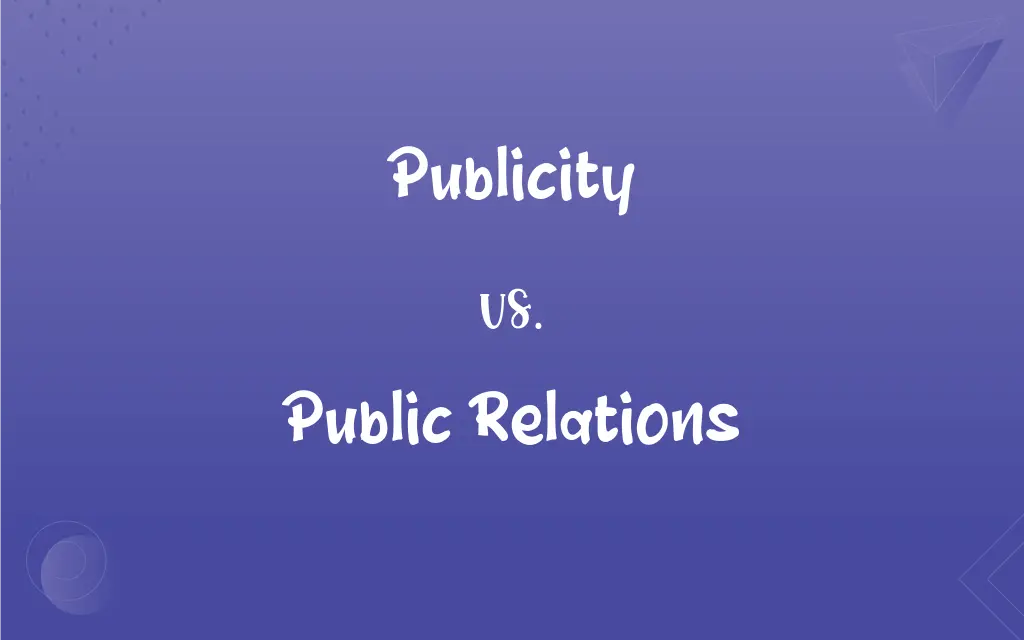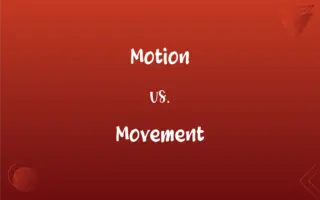Publicity vs. Public Relations: What's the Difference?
Edited by Aimie Carlson || By Harlon Moss || Published on November 22, 2023
Publicity is the act of gaining media attention, while public relations is the strategic management of an organization's communication with the public.

Key Differences
Publicity is primarily concerned with garnering media attention for a specific event, person, or product. It focuses on gaining exposure through various media channels, often without the direct control over the final message. On the other hand, public relations encompasses a broader spectrum, managing and shaping the public perception of an organization or individual over time.
While publicity can be a component of a PR strategy, it's more spontaneous and can be both positive and negative. For instance, a celebrity scandal can generate unwanted publicity. Conversely, public relations aims at creating a positive and consistent image of an entity, using a myriad of tools and tactics beyond just media exposure.
The realm of publicity is generally shorter-term, reacting to specific events or opportunities to promote something in the media. This could be a product launch, an event, or a news story. Public relations, however, operates on a longer timeline, strategically building relationships, crafting messages, and managing reputations.
Publicity usually seeks to be noticed and is often measured by the amount and type of media coverage received. Whether it's a news article, a TV segment, or a viral social media post, the goal is exposure. Public relations, while it can include seeking such exposure, is more concerned with how that exposure impacts the overall perception and reputation of the brand or individual.
In essence, while publicity is about getting noticed, public relations is about crafting and maintaining a specific image or narrative in the public's eye, using a variety of communication strategies and channels.
ADVERTISEMENT
Comparison Chart
Definition
The act of gaining media attention.
The strategic management of communication with the public.
Duration
Short-term focus.
Long-term focus on building and maintaining image.
Control
Less control over the final message.
More control over messaging and narrative.
Scope
Specific events, products, or news.
Broader management of public perception and relationships.
Outcome
Measured by type and amount of media coverage.
Measured by the impact on reputation and public perception.
ADVERTISEMENT
Publicity and Public Relations Definitions
Publicity
The notice or attention given by the media.
The movie received a lot of publicity upon its release.
Public Relations
The management of communication between an organization and its publics.
Her expertise in public relations helped shape the brand's narrative.
Publicity
The dissemination of information or promotional material.
Their new product launch was accompanied by a massive publicity campaign.
Public Relations
The practice of managing and clarifying the spread of information.
Public relations specialists worked to clarify the misconceptions.
Publicity
The process of bringing something to the public's attention.
The author went on a book tour for more publicity.
Public Relations
The professional maintenance of a favorable public image.
The company hired a public relations firm after the scandal.
Publicity
Public visibility or awareness.
The controversial statement brought him unwanted publicity.
Public Relations
Strategies and activities used to promote goodwill.
The charity event was a public relations success.
Publicity
Information meant to promote or publicize.
The artist dropped hints as a publicity stunt.
Public Relations
Building and sustaining a positive reputation.
Their public relations team consistently highlighted their community involvement.
Publicity
Public interest, notice, or notoriety generated or gained by disseminating information through various media
The book has received widespread publicity.
Public Relations
Public relations in attributive use
Publicity
The act, process, or occupation of disseminating information to gain public interest
The company's ongoing publicity of its new product.
Has a job in publicity.
FAQs
Is all publicity good publicity?
Not necessarily; while publicity brings attention, it can be positive or negative, whereas public relations aims to ensure it's positive.
Does publicity always mean media coverage?
Mostly, but publicity can also refer to attention from the public, irrespective of media involvement.
How does public relations handle crises?
Public relations strategizes to manage, mitigate, or redirect negative perceptions during crises.
What's the main goal of public relations?
Public relations aims to shape and maintain a positive image and foster a good relationship with the public.
Why is public relations important for businesses?
Public relations builds trust, manages reputation, and fosters positive relationships with stakeholders.
How long does the impact of publicity last?
Publicity has a shorter-term impact, while public relations seeks lasting positive perception.
Can publicity be planned?
While publicity can be sought through events or promotions, its exact form and reach are often uncontrollable.
How can one measure the success of publicity?
Publicity success is often measured by the amount and type of media coverage received.
How can bad publicity affect a brand?
Negative publicity can harm a brand's reputation, sales, and stakeholder trust.
Can any news be turned into positive publicity?
Not always, but with strategic public relations, negative news can be managed or mitigated.
Is public relations proactive or reactive?
Public relations can be both: proactive in building a positive image and reactive in addressing issues.
What tools do public relations professionals use?
Public relations tools include press releases, media kits, events, and communication strategies.
How do public relations and marketing differ?
While both promote a brand, public relations focuses on reputation and relationships, and marketing on sales.
Why is some publicity unexpected?
Since publicity can arise from unforeseen events or actions, its nature can be unpredictable.
How does public relations benefit individuals?
Public relations can enhance personal reputation, manage public perception, and build beneficial networks.
Is public relations just about media relations?
No, public relations encompasses more than media, including stakeholder relations, events, and reputation management.
How do public relations professionals build relationships?
Public relations builds relationships through consistent communication, transparency, and understanding stakeholder needs.
What can trigger negative publicity?
Scandals, mishaps, or controversial actions can lead to unwanted publicity.
How can a company handle unexpected negative publicity?
With swift and strategic public relations response, addressing concerns and clarifying facts.
Why is consistency important in public relations?
Consistency in public relations ensures a stable, trustworthy, and reliable image in the public's eye.
About Author
Written by
Harlon MossHarlon is a seasoned quality moderator and accomplished content writer for Difference Wiki. An alumnus of the prestigious University of California, he earned his degree in Computer Science. Leveraging his academic background, Harlon brings a meticulous and informed perspective to his work, ensuring content accuracy and excellence.
Edited by
Aimie CarlsonAimie Carlson, holding a master's degree in English literature, is a fervent English language enthusiast. She lends her writing talents to Difference Wiki, a prominent website that specializes in comparisons, offering readers insightful analyses that both captivate and inform.































































